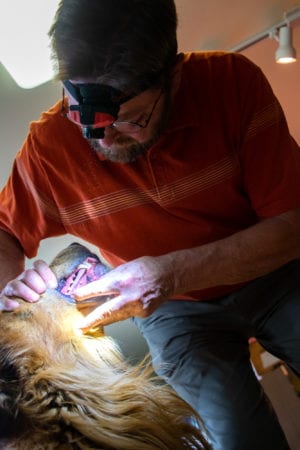
When veterinarian Dr. Ken Hill visits Cordova, he examines upwards of 10 animals per day, neutering, dispensing vaccinations, cleaning teeth and conducting blood tests. During his most recent visit, Hill removed a gumball-sized tumor from a dog’s tail. But not all pet health problems are so obvious.
“I’m trying to do prevention and maintenance,” Hill said. “It boils down to being observant, watching for trends in your critter. You should look for signs of lethargy, being overweight or having a dull hair coat. When you see that happening, make sure that you visit the vet on the next go-around.”
Deceptively subtle symptoms like bad breath or drinking more water should be cause for concern, Hill said. Changes in water intake can signal organ problems, and the bacteria from halitotic mouths can put cats and dogs at risk of microscopic abscesses that deteriorate kidney tissue. Cats are more vulnerable to these abscesses than dogs, Hill said.
Many health concerns that are commonplace among humans also apply to pets. Aging cats and dogs, like aging humans, are at risk for arthritis. Conversely, microscopic abscesses provoked by poor oral hygiene can afflict humans as well as cats, Hill said.
Neutering and spaying dogs is important not just to prevent unwanted litters of puppies, but to lower dogs’ cancer risk, Hill said. Around age 5, the risk of tumors among cats and dogs increases. Dogs that haven’t been spayed or neutered remain at heightened risk of mammary or testicular cancer.
Hill divides his time between practices in Cordova and Petersburg and aboard the M/V Hallie, a waterborne clinic that allows him to service smaller communities across Southeast Alaska. His visits to his hometown of Cordova, occurring roughly every six weeks, are usually about 10 days long. Hill prefers to remain cagey about the exact length of his stays in order to avoid a rush the day before he leaves, he said.
When Hill isn’t present, appointments are handled by veterinary assistant Laurel Troudt. Troudt, who is also a certified emergency medical technician, is qualified to vaccinate pets, to deworm them, to trim their nails and to express their anal glands. Troudt is also able to describe pets’ maladies to Hill by phone, allowing him to make a provisional diagnosis.
“Wherever I go, there’s no other vet doing it, so people are very appreciative,” Hill said. “That’s very nice and rewarding … The human-animal bond is important to people of all ages, for their mental wellbeing and even physical wellbeing.”





